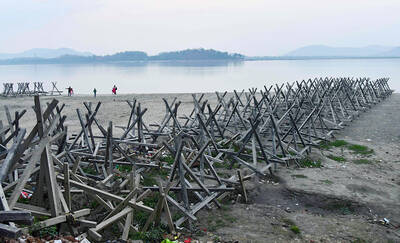Google has said that it identified cyber-attacks aimed at silencing opposition to a Vietnamese government-led bauxite mining project involving a major Chinese firm and said they were similar to those at the heart of the company’s friction with Beijing.
The computer security firm McAfee, which detected the malware, went a step further, saying its creators “may have some allegiance to the government of the Socialist Republic of Vietnam.”
The Vietnamese Foreign Ministry had no immediate comment.
Malware infected “potentially tens of thousands of users” who downloaded what they thought was Vietnamese keyboard software, and possibly other software, Neel Mehta of Google’s security team said in a post on Tuesday on the firm’s online security blog.
“These infected machines have been used both to spy on their owners as well as participate in distributed denial of service [DDoS] attacks against blogs containing messages of political dissent,” Mehta wrote. “Specifically, these attacks have tried to squelch opposition to bauxite mining efforts in Vietnam, an important and emotionally charged issue in the country.”
In other developments, Google said on Tuesday that a deeper look at trouble with results at its Chinese-language search engine indicated the cause was “The Great Firewall of China” erected by censors there.
The US Internet giant had initially thought that recent changes to its search software had misled China censors into thinking queries were for Radio Free Asia.
Google backed off that conclusion after it realized that it had upgraded its search parameters about a week before results stopped showing up for many queries at its Chinese-language engine.
“So whatever happened today to block Google.com.hk must have been as a result of a change in the great firewall,” a Google spokesman said. “However, interestingly our search traffic in China is now back to normal — even though we have not made any changes at our end.”
China’s notoriously sophisticated Internet censorship is referred to as “The Great Firewall.”
Google said it will continue to monitor what is going on, but for the time being “this issue seems to be resolved.”
Google upgraded search code parameters worldwide to include a “gs_rfai” string of characters as part of a modification intended to improve query results, the company said.
Engineers at the firm initially suspected problems with China search results were caused by censorship software in that country mistaking the “rfa” characters as referring to Radio Free Asia (RFA), the US-funded broadcaster transmitted across Asia that is routinely jammed by Chinese authorities.
RFA president Libby Liu said in response to their unintended association with the Google dispute that the development was “a stark reminder to the world of China’s repressive control of the Internet and free speech for its citizens.”
“It’s time for China to stop exerting draconian control of its cyberspace, and allow accurate and objective information to flow freely within its society,” Liu said in a statement released out of Washington.
Google also said it has yet to pinpoint the cause for its mobile Internet service being partially blocked in China.
The US Internet giant reported on Monday that its mobile Internet service in China was partially blocked, but it was unknown whether the trouble was related to its stand-off with Beijing over censorship.
Google mobile includes search, map, news and other services for smartphones and other Internet-enabled handsets.
Sensitivity to problems with Google offerings in China heightened since the company last week said it would no longer bow to government censors in Beijing by filtering its search results and effectively shut down its Chinese search engine, rerouting mainland users to its uncensored site in Hong Kong.

WAKE-UP CALL: Firms in the private sector were not taking basic precautions, despite the cyberthreats from China and Russia, a US cybersecurity official said A ninth US telecom firm has been confirmed to have been hacked as part of a sprawling Chinese espionage campaign that gave officials in Beijing access to private texts and telephone conversations of an unknown number of Americans, a top White House official said on Friday. Officials from the administration of US President Joe Biden this month said that at least eight telecommunications companies, as well as dozens of nations, had been affected by the Chinese hacking blitz known as Salt Typhoon. US Deputy National Security Adviser for Cyber and Emerging Technologies Anne Neuberger on Friday told reporters that a ninth victim

Russia and Ukraine have exchanged prisoners of war in the latest such swap that saw the release of hundreds of captives and was brokered with the help of the United Arab Emirates (UAE), officials said on Monday. Ukrainian President Volodymyr Zelenskiy said that 189 Ukrainian prisoners, including military personnel, border guards and national guards — along with two civilians — were freed. He thanked the UAE for helping negotiate the exchange. The Russian Ministry of Defense said that 150 Russian troops were freed from captivity as part of the exchange in which each side released 150 people. The reason for the discrepancy in numbers

A shark attack off Egypt’s Red Sea coast killed a tourist and injured another, authorities said on Sunday, with an Italian Ministry of Foreign Affairs source identifying both as Italian nationals. “Two foreigners were attacked by a shark in the northern Marsa Alam area, which led to the injury of one and the death of the other,” the Egyptian Ministry of Environment said in a statement. A source at the Italian foreign ministry said that the man killed was a 48-year-old resident of Rome. The injured man was 69 years old. They were both taken to hospital in Port Ghalib, about 50km north

POWER PLAY: The dam is planned to more than triple the 88.2 billion kilowatt-hours designed capacity of the Three Gorges Dam, which is currently the world’s largest China has approved the construction of what would be the world’s largest hydropower dam, launching an ambitious project on the eastern rim of the Tibetan plateau that could affect millions downstream in India and Bangladesh. The dam, which would be in the lower reaches of the Yarlung Zangbo River, could produce 300 billion kilowatt-hours of electricity annually, according to an estimate provided by Power Construction Corp of China in 2020. That would more than triple the 88.2 billion kilowatt-hours designed capacity of the Three Gorges Dam, currently the world’s largest, in central China. The project would play a major role in meeting China’s